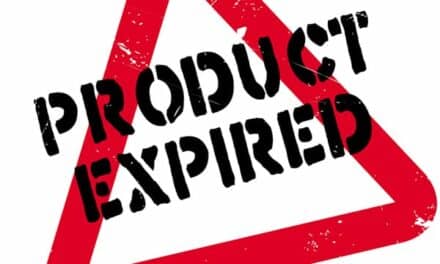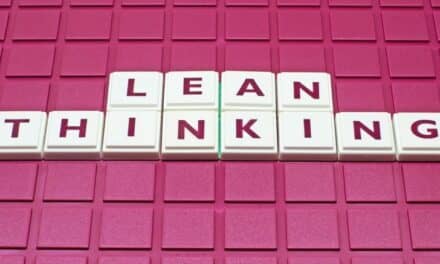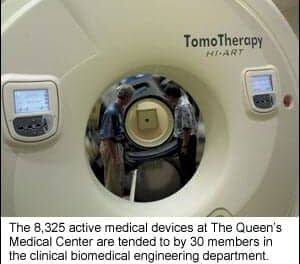By Rick Schrenker
Note: This column will be a two-parter—as long as you chime in.
Several months ago—an eternity, it seems now—I wrote about what HTM’s COVID-19 encore would look like. (Read my article at bit.ly/38eIJhq.) I had been working from home for less than a month at that point, keeping busy with the work I had brought with me and a ventilator project that I’d joined.
My glimpses into what was going on in the hospital came from conversations with my colleagues in my department and during Zoom meetings on the vent project. And those glimpses were of a world unlike anything I’d experienced in my 41-year hospital career. And so I wondered what it would be like once CE/HTM got to the other side of the COVID-19 pandemic. What would it be like on the other side of the peak? Which innovations would stick? Which wouldn’t?
As it turns out, those questions are not ones I’ll be helping to address, at least not from the inside, as I decided to retire in August. But my curiosity got the better of me when I saw the first book published (to my knowledge, anyway) about what it was like for an integrated health system that was in the thick of things. It’s a quick read. It’s also a valuable contribution to the documentation of the COVID-19 pandemic, if for no other reason than it’s already available. Anyone who has investigated an incident knows that memories fade quickly.
Leading Through a Pandemic
“Leading Through A Pandemic” tells the story of what New York State’s largest healthcare provider, Northwell Health, experienced during the early months of the COVID-19 pandemic. Written by Northwell’s CEO Michael Dowling and chief journalist Charles Kenney, it shares their perspectives as well as many others’ up until early summer. Much of what it describes about the “fog of war” environment in that first month match my glimpses. While it talks a lot about technology, it never mentions CE/HTM. Regardless, it would be interesting for others who were on site elsewhere to compare their experiences with those of Northwell.
The book’s chapter titles are illuminating in themselves. The introduction is titled “Humbling Lessons.” Among the chapters are “A Culture of Preparedness,” “Protecting the Supply Lifeline,” “Policy Regulation—The Government’s Role,” and last but not least, “Looking Forward—Preparing for the Future.”
That last chapter includes a “prescription”: Thirteen Steps to Prepare for Current and Future Viral Threats. Some are what you’d expect, like “Protect the physical and emotional health of staff.” Others are more provocative, e.g., “Reverse America’s cultural disrespect for science” (it’s a shame that’s provocative, but it is). And it closes with “Commit to Creating a New Normal.”
And this is the part where you come in. But permit me to digress briefly for a historical comparison.
The Next Greatest Generation
I remember asking my dad, who served in the Navy during WWII, “What did you do during the war?” He didn’t talk about it much, nor did my aunts and uncles. The Greatest Generation, they called them. But not just because of what they did during the war; they also did great things after. Their wartime experiences somehow motivated them to not just rebuild the United States economy but also those of Europe and Japan.
It would be an honor for me to continue this column as a sort of time capsule with any part of your story you would be willing to share. Like the Northwell book, it can help inform others. And from time to time, remind you.
What did you do during the first 11 months of 2020 that you never thought you would do in your working lifetime? Did you experience any humbling lessons? How did you balance following regulations and dealing with immediate needs? What did you learn about yourself? Your colleagues?
How has what you experienced motivated you? Affected you? Is there anything about your workplace you want to change as a result of your experiences? Do you think coming to work will ever feel the same again? Have you been motivated to do anything differently outside of work, e.g., volunteer for an activity you might not have before?
What will you say when some years down the road someone asks you, “What did you do during the pandemic?” And what will you do now? The opportunity to be the next “Greatest Generation” is here. That’s what we do for an encore.
Rick Schrenker is a former systems engineering manager for Massachusetts General Hospital. Questions and comments can be directed to 24×7 Magazine chief editor Keri Forsythe-Stephens at [email protected].






Rick, I had not heard you retired, best wishes. I know you will continue to share your wealth of Clinical/Biomedical Engineering expertise (old habits stay with us..). I find retirement to be a mixed blessing, while I have more time for myself, I do miss the Clinical Engineering and hospital environment. I do not have any Covid-19 input stories, but I can surmise hospital administrators must appreciate, now more than ever, the contributions that Clinical/Biomedical Engineering staff bring to the hospital. I am confident the ability to “think on one’s feet” and innovate to problem solve will well serve those that remain doing battle in Clinical Engineering.
Philip Levine CBET-E Brigham and Women’s Hospital